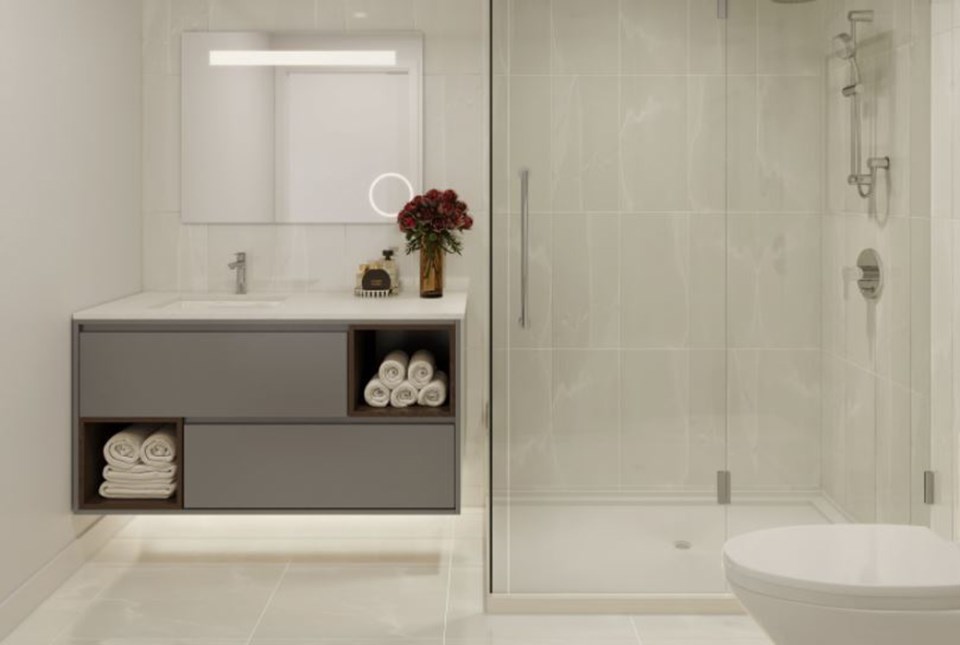Bathroom and kitchen renovations are among the most popular home improvement projects, and also among those delivering the best value according to the Appraisal Institute of Canada.
Regular surveys have shown that money spent refreshing and improving bathrooms and kitchens will be largely recovered at the time of sale, at rates of anywhere between 75 and 100 per cent.
But a report the Canadian Federation of Independent Business released this week indicates that the payback timeline can be much longer in Vancouver than anywhere else in Canada.
An analysis of the permits and costs required for a $20,000 project to convert a simple powder room into a full bathroom in 12 major cities across Canada found that Vancouver had the highest permitting costs, and along with Toronto, had the highest document requirements.
Renovating a powder room in Vancouver requires an additional 11 documents with a cost of $2,029, while Charlottetown, perhaps the most renovation-friendly city in the east, requires just five documents at a cost of $180.
The documents include site plans, floor plans and construction plans as well as permits.
“These documents can be considerable sources of red tape, with some municipalities requiring forms that necessitate the services of an engineer or other professionals, adding to the overall cost of the application,” the report notes.
“If there are these many obstacles for a simple bathroom renovation, imagine how costly and time-consuming it is to permit a secondary suite, a complete renovation or a new build. Permitting costs and processes should be straightforward and affordable,” said Francesca Basta, CFIB’s research analyst and co-author of the report.
CFIB recommends a variety of solutions, including the use of technology to automate and simplify the approvals process as well as improving access to information that streamlines the permitting process. Clear service standards and permitting times would also provide accountability.
It calls out an initiative in Kelowna that uses artificial intelligence (AI) to guide applicants through the permitting and approvals process, and encourages other municipalities to do the same.
Speaking as part of an Urban Land Institute panel last fall on the use of AI to streamline the development process, Kirsten Sutton of 3D Dimension Drafting & Design Inc. in New Westminster saw the potential for AI to make it easier for small builders to undertake projects, freeing up resources to deal with larger, more complex projects.
“There are some people who just want a basic house,” she said. “The flattening of the process will dramatically affect how many applications can be approved.”
This is especially critical in the BC housing market, which has a deepening shortfall of affordable housing.
Vancouver is the city with the highest home prices and greatest shortages in Canada, CFIB said, and red tape is a leading factor.
“British Columbia’s housing shortage makes it especially important for municipal governments to prioritize reducing renovation costs and paperwork,” said Emily Boston, BC policy analyst with CFIB. “Reducing red tape in permitting processes is one low-cost way governments can help address housing challenges and get homes built faster.”
Several municipalities are making strides in reducing red tape for new developments.
Three were honoured by commercial real estate association NAIOP on Feb. 1 for their efforts to keep permitting costs in check, shorten approval times and generally make themselves a better place to do business.
Delta, which held the line on fees while other municipalities raised theirs, was recognized for the most improved fee environment.
Burnaby was honoured for having the most-improved entitlement timelines, which implemented several new policies that contributed to a greater reduction than seen in other municipalities.
The most business-friendly municipality was Richmond, which has made strides since 2021 to support investment and the development of jobs space.



